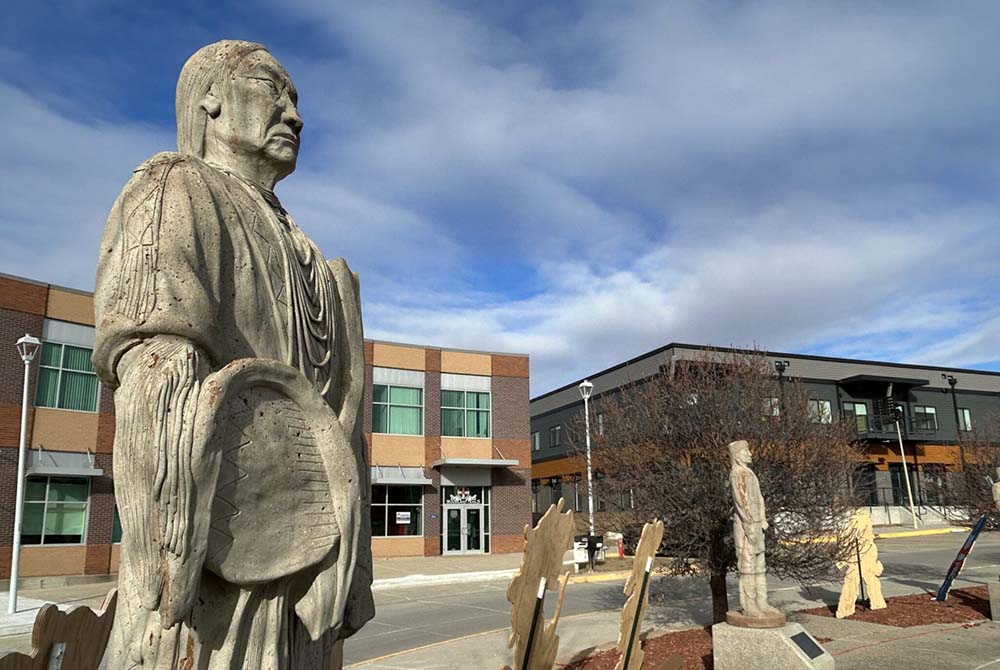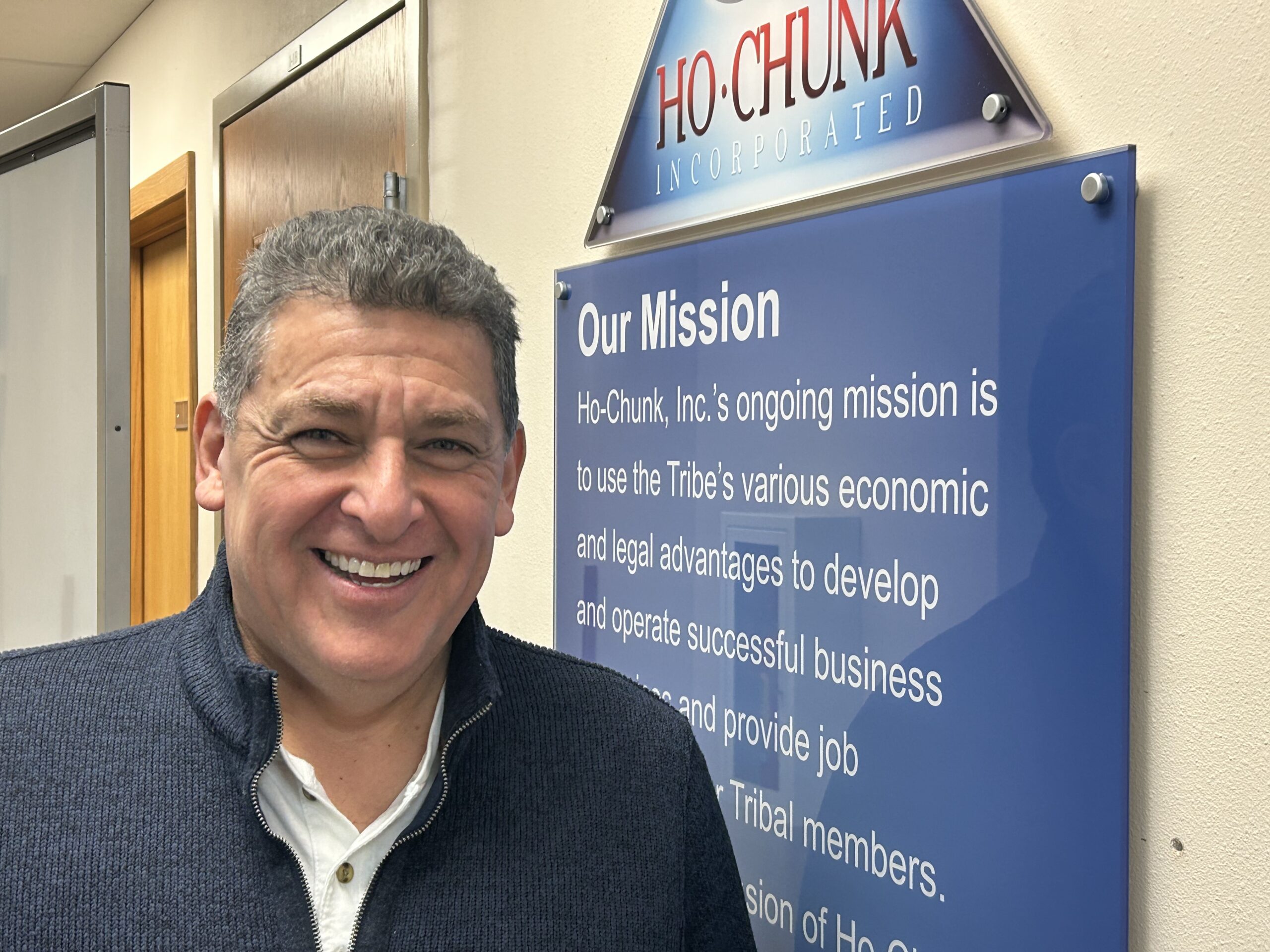
- Details
- By Paul Hammel, Nebraska Examiner
- Economic Development
WINNEBAGO, Nebraska — Thirty years after Ho-Chunk, Inc., was launched in a spare bedroom in Lance Morgan’s apartment, the award-winning tribal enterprise has grown into an international corporation that projects revenue of $600 million and employment of 3,000 people by the year’s end.
This article was originally published in the Nebraska Examiner.
Its handful of subsidiaries have done federal contracting work for the U.S. Space Force, NASA and U.S. Department of Defense among others. Its construction operation has built dozens of affordable homes on the Winnebago Reservation and elsewhere. And its financing arm has helped dozens of tribal families realize the dream of owning their own home, building equity and wealth.
The median household income on this northeast Nebraska reservation is way up — it rose 78% from 1989-2000 to $58,204 — doubling the size of the middle class. Morgan — Ho-Chunk’s president and CEO from the start — calls the organization “an engine of social mobility.”
When the company’s gambling casinos in Omaha and Lincoln get fully up and running within six to seven years, he predicts, corporate revenue will exceed $1 billion a year.
“We’re about to go on a growth spurt that’s unprecedented for us,” said the 56-year-old Harvard Law School graduate. “But there’s a lot of mouths to feed, and a lot of worthy goals to do.”
 Despite major growth of Ho-Chunk, Inc., the economic development wing of the Winnebago Tribe, its longtime president and CEO Lance Morgan says there’s more work to do, ‘more mouths to feed.’ (Paul Hammel/Nebraska Examiner)Despite the success of the tribe’s economic development arm, the reservation of 2,700 people still struggles with the problems confronted by many reservations — substance abuse, unemployment and poverty. Unemployment there has dropped over three decades by 5%, to about 17%. And most of HoChunk’s employees don’t live on the reservation.
Despite major growth of Ho-Chunk, Inc., the economic development wing of the Winnebago Tribe, its longtime president and CEO Lance Morgan says there’s more work to do, ‘more mouths to feed.’ (Paul Hammel/Nebraska Examiner)Despite the success of the tribe’s economic development arm, the reservation of 2,700 people still struggles with the problems confronted by many reservations — substance abuse, unemployment and poverty. Unemployment there has dropped over three decades by 5%, to about 17%. And most of HoChunk’s employees don’t live on the reservation.
“We’re dealing with seven to eight generations of poverty and social problems,” Morgan said. “We still have some long-term, entrenched poverty that’s hard to break.”
Tribal elders, he said, don’t care about Ho-Chunk’s financials, but how their lives have been improved.
“What we are evaluated on is creating long-term income for the tribe and long-term jobs — really making peoples’ lives better,” Morgan said. “My job is to provide the opportunity, if you get on the right path.
“But a lot of people are not on that right path yet.”
A different place now
“Poverty” and “problems” are not the words that come to mind when you look at the north side of Winnebago, a village of 888 amid the bluffs along the Missouri River.
That’s where Ho-Chunk, over the past two decades, has built what amounts to a new town, Ho-Chunk Village, a planned community of more than 200 homes, 48 affordable apartments and 20 units for tribal elders connected by walking paths to shops and offices.
The Sweetwater Cafe there looks like something you’d see in Omaha’s Old Market or Lincoln’s Telegraph District, serving up mochas and lattes in a fashionable setting of wood and brick.
Across the street, a steady stream of shoppers walk in and out of the Dollar General store.
Handsome office buildings surround a circular sculpture garden, honoring the clans of the Winnebago Tribe, which was ceded the northern part of the Omaha Indian Reservation in 1865 after being forcibly removed from its ancestral home in central Wisconsin and northern Illinois.
As she checked out shoppers at Dollar General, Jessica LaTray, 30, sang the praises of Ho-Chunk for getting her into a rent-assisted apartment in Ho-Chunk Village.
“Oh my gosh, I have my own space,” LaTray said. The cost is well below the market rate for apartments in Sioux City, 20 miles north of Winnebago, she said.
Down U.S. Highway 77 a bit, a new fire hall is rising next to a new child care center under construction. Soon, ground will be broken on a new Boys and Girls Club, thanks partly to COVID-19 grants. At Ho-Chunk Village, workers hammer on a new, 40-unit apartment building.
Judi gaiashkibos, the long-time executive director of the Nebraska Commission on Indian Affairs, called Morgan “an iconic leader who has really stayed the course” creating an economic development entity that is admired by many tribes.
She recalled that when he first launched Ho-Chunk, Inc., “he comes in and tells me all this stuff he’s going to do. And guess what, he did it, and more.”
Building capital
One of Morgan’s greatest successes, gaiashkibos said, has been to strike a balance between funding “instant gratification” with long-term investments.
When Morgan gazes out at Ho-Chunk Village from the glass-walled corporate offices of Ho-Chunk, Inc., he not only sees new homes, but wealth creation.
For qualifying tribal members, Ho-Chunk’s homeowner assistance program builds homes at cost, offers a free lot to build on, and provides up to $75,000 for a downpayment for families who meet income guidelines. The downpayment loan is forgivable after five years if, he said, “you have to have your act together.”
The result, Morgan said, is that a family now has collateral to obtain loans for cars or educational expenses, and has built a cache of wealth that they can pass on to their children. That doesn’t happen for tribal members who live in government housing, he said.
Isaac Smith, the vice chairman of the Winnebago Tribal Council and chair of the Ho-Chunk, Inc., board of directors, said that the corporation has been a positive force for the tribe.
“They continue to make good strides for the betterment of the people,” Smith said. “We just have to remember that the poorest need the most.”
He added that “communication” between Ho-Chunk and the tribe has sometimes fallen short, but has improved in recent years.
Smith said that between the tribe and Ho-Chunk, there’s $100 million worth of construction projects underway on the reservation. The housing program run by Ho-Chunk, he said, has improved many lives.
Leadership matters
Morgan said that Ho-Chunk has thrived where other tribal corporations have not because the nine-member Winnebago Tribal Council is elected on a rotating basis, with three facing election every three years. Many tribes elect entire councils at each election, causing a turnover that leads to abandoning previous projects and priorities, destroying continuity and commitment to long-term goals.
Ho-Chunk, he added, also has successfully built its own talent and training its own workforce. Few college graduates lived on the reservation 30 years ago, but since then, its internship program has introduced hundreds of reservation kids to the business world. College and career development programs are also offered.
“You’re not going to get a bunch of Harvard MBAs to come to Winnebago to work for a start-up company,” Morgan said. “I know. I played rugby with them.”
The tribe, he said, has yet to reap a cent from the new casinos run by Ho-Chunk subsidiary, WarHorse Gaming, and that has caused some frustration within the tribe.
“I’m not sure I’m the most popular guy in town right now,” Morgan said, with a characteristic chuckle.
That’s because Ho-Chunk has to first pay off $300 million in Wall Street loans that financed the casino construction, he said. After that, the first $100 million or so of additional profits will be used to expand the Lincoln casino and start on a casino planned in South Sioux City, at the former Atokad Downs Racetrack owned by Ho-Chunk.
There’s some irony at work at Atokad. Morgan said it was the advent of casino gambling in Iowa that financially devastated the Winnebago’s initial casino near Sloan, Iowa. That prompted the creation of Ho-Chunk, Inc., in 1994, to diversify the tribe’s economic development efforts.
When the Atokad casino opens, he said, he’s hoping to hurt the handle at Sioux City’s Hard Rock Casino — which out-bid Ho-Chunk to operate a casino there. Ultimately, Morgan said he hopes to then buy that casino.
“Any time an Indian tribe has ever had something, it has been taken from them. So we are paranoid,” he said.
Ballot fight
Ho-Chunk primarily financed the effort to get casino gambling on the Nebraska ballot. The effort failed once, and the second time, took a legal battle that ended up in the Nebraska Supreme Court. Ho-Chunk spent millions to collect signatures and pitch the constitutional changes, which passed by nearly a 2-to-1 margin on the 2020 ballot.
“To me, gaming is a means to an end, and the end is a better life,” Morgan said.
More than once, he has been in hot water with tribal leaders, and his firing as head of Ho-Chunk was on the tribe’s agenda in 2020 until the Supreme Court ruled that the gambling initiatives would not be tossed off the ballot.
“I’m like a cockroach … hard to kill, hard to get rid of,” he joked about his past fights with the tribal leadership.
Over the years, Morgan and Ho-Chunk have won several awards for their work from the U.S. Department of Commerce, the Small Business Administration and Harvard. Morgan was selected as a “Champion of Change” by the White House in 2011, and a year later, he was given the “Nebraska Builder Award” by the University of Nebraska, where he had graduated with an economics degree. He gave the keynote speech during commencement exercises in 2012.
But after 30 years running Ho-Chunk, Inc., he said he has already identified his successor and looks to the day, someday, when he’s more of an adviser than a day-to-day manager.
Morgan has had other offers, and, at one time, considered becoming a law professor. He teaches law students from Arizona State University every other year at the Winnebago Reservation but has been cutting back from teaching every year.
When asked why has he stayed, he responded, “It’s important work.”
Companies, civilizations and economies rise and fall, come and go, Morgan said, so he is proud that Ho-Chunk has survived “the test of time” for 30 years.
“But as much as we’ve done, I wish we could do more,” he added. “We still have a large portion of our community struggling.”